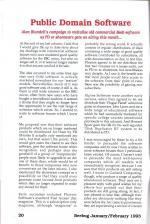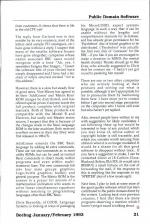
Beebug
 1st January 1993
1st January 1993
Author: Alan Blundell
Published in Beebug Volume 11 Number 8
Alan Blundell's campaign to revitalise old commercial Beeb software as PD or shareware gets an airing this month...
Public Domain Software
At the end of my last column, I said that I would give the up to date story about my dealings with commercial software houses who once marketed good quality software for the BBC micro, but who no longer sell it, or at least no longer market it so that anyone can find it for sale.
The idea occurred to me some time ago that very little software is actively marketed nowadays for our 'mature' models. Nevertheless, much of it was good software and, of course, it still is. As there is still wide interest in the BBC micro, often from new users who have bought a second-hand machine, it seemed a shame that they might no longer have the opportunity to see the vast range of software which exists. So, I started to write to software houses which I knew of.
My proposal was that their software products which are no longer marketed could be distributed for them by PD libraries (I actually only mentioned my own, but that wasn't the point). This would give users the chance to see their software, give the software house wider recognition and perhaps also the goodwill of a group of 'computerate' people most likely to upgrade to an Arc one of these days, which would be of benefit to those companies who now concentrate on the later micros. I also mentioned the shareware concept as a possibility so that they could even generate some income from products which they no longer expected to make any money for them.
Early successes included Phoenix Software's excellent 'Fast Access' disc magazine. This is a subscription only magazine, although 'magazine' is probably the wrong word. It actually consists of regular distributions of discs containing a wide range of good quality software contributed by subscribers, all with documentation on disc in text files.
Phoenix agreed to let me distribute the first two volumes (of 6 issues each), not as PD or as shareware, but nevertheless very cheaply. As I saw it, the benefit was that more people would have access to the software; from their point of view, there was the possibility of gaining new subscribers.
Alpine Software were another early success, when they agreed to let me distribute their Plague Planet adventure game as shareware. John Lyons sent me a wide range of educational software which he had successfully marketed for specific college courses (mentioned previously in this column). And Howard Spurr gave the OK for his well regarded Disk Duplicator III system to be distributed as PD.
I was encouraged by these to try a bit harder to persuade the software companies and by now I have written to more software houses than I previously knew existed. Of course, I haven't tried to persuade the most well-known companies which all readers will immediately recognise, because I am sure that their products are still selling well. I wrote to Garland Computing, though, who produce a range of quality educational software. They sent me a pleasant reply with good wishes for my efforts but pointed out that their products are still going strong.
In fact, I was pleased to hear that, although their sales are obviously nothing like they were before the Arc came to prominence, they are experiencing a revival of interest from customers. It shows that there is life in the old CPU yet!
The reply from Garland was in fact notable by its very existence; most of the letters (and sample PD catalogues, etc.) have gone without a reply. I suspect that many of the smaller software houses have gone altogether; companies whose names seasoned BBC users would recognise with a fond "Ah, yes, I remember Enigma Disc Imager...." (insert the software title of your choice) have simply disappeared and I have had a fair share of letters returned marked "not at this address".
However, there is a slow but steady flow of good news. Vine Micros has agreed to let their AddComm and Matrix ROM images be distributed, and has offered special prices if anyone wants the full product, complete with original manuals. Both of these products are compatible with the Model B and Electron, but sadly not Master series micros; I suspect that this is because of the changes made in the Basic language ROM in the later machines. Both received excellent reviews in their day (they were first released in 1984/5).
AddComm
AddComm extends the BBC Basic language by adding 40 extra commands. These are not star-commands as in most utility ROMs, but can be used as normal Basic commands in direct mode, within programs and even within multi-statement lines. The new commands fall into four main groups: graphics; Logo/turtle graphics; toolkit; and general purpose.
Matrix
The Matrix ROM is the answer to a prayer for anyone of a mathematical inclination who wants to solve linear simultaneous equations without resorting to programming languages other than BBC Basic.
Chris Reynolds, of CODIL Language Systems, is looking at ways of packaging his MicroCODIL expert systems language in such a way that it can be usable without the lengthy and comprehensive manuals for re-release, and has already given permission for his Psychebrot disc of fractal graphics to be distributed. (Psychebrot was actually the first ever disc of 'careware' for the BBC - if you like it you are encouraged to make a donation to MIND, the mental health charity.) Thanks should go to Rik Gray, who actually suggested to Chris that he contact me - I hadn't yet got round to pestering him myself.
There are one or two other companies who are actively looking at their products and sorting out what is possible, although it isn't appropriate for me to pressurise them by mentioning them here. I have more yet to contact before I get into second stage persuasion on the companies who I know still exist but who haven''t yet replied.
Also, several people have written to me with suggestions for likely candidates. I am following these up but would be interested to hear of any product which you may know of, whose author or copyright holder is still traceable, and which you consider worth rescuing from oblivion when it is no longer marketed. It would be a shame for all that good software to disappear without trace... If you have a suggestion to make, I can be contacted direct at 18 Carlton Close, Blackrod, Bolton, BL6 5DL (it would save Beebug a small fortune on the cost of forwarding the mail, if the response to this is anything like the response to my 'SPRITER' plea of a few issues ago!).
Next time, I plan to look at some more of the good quality software which has been contributed to the public domain direct by the writers. Looking back over previous columns, I find that there are many programs deserving a mention which I haven't yet got round to talking about.
This article was converted to a web page from the following pages of Beebug Volume 11 Number 8.



